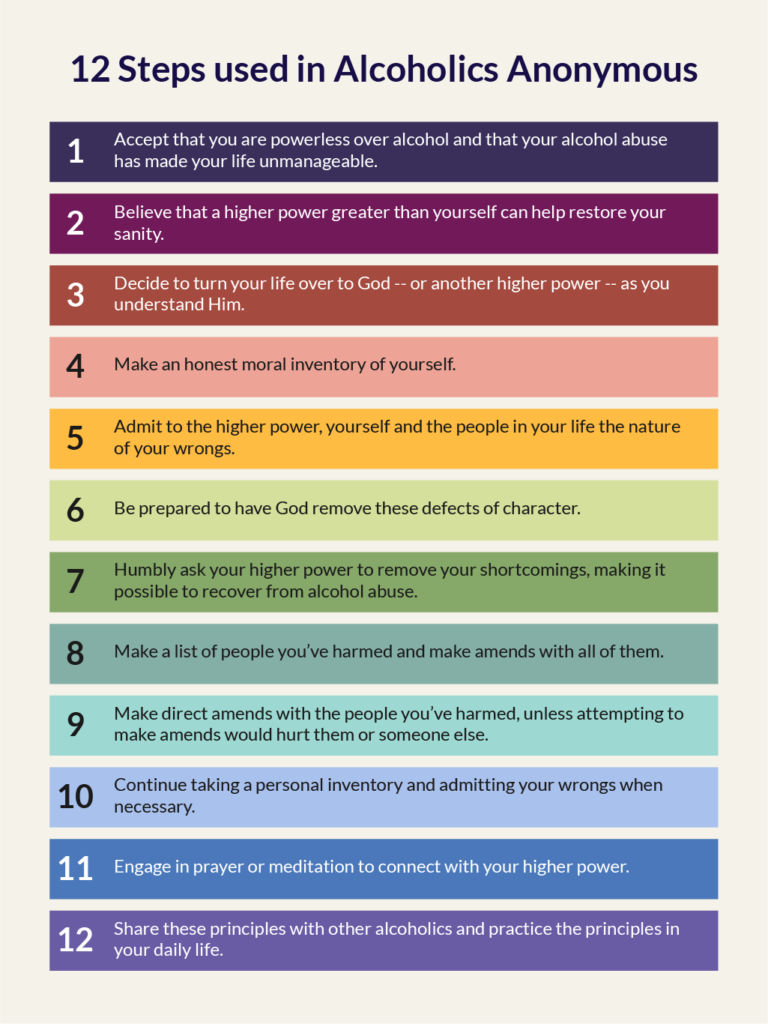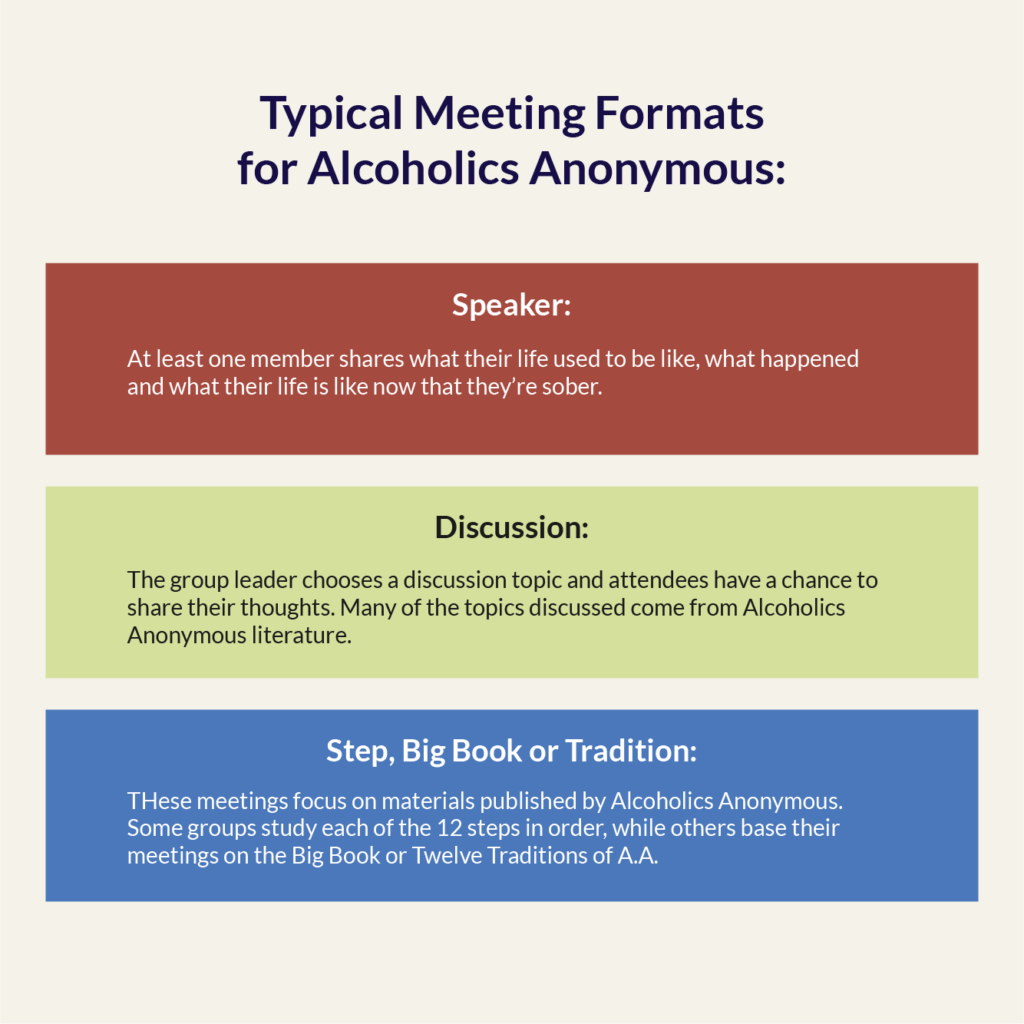
According to the National Center for Drug Abuse Statistics, 15 million Americans are living with alcohol use disorders, and more than 39 million people aged 12 and older are current users of illegal drugs. Substance abuse has profound effects on a person’s physical and mental health, and it can also make it difficult to reach personal goals and maintain fulfilling relationships with loved ones.
Those seeking addiction treatment can benefit from participation in 12-step programs, which are readily available and provide ongoing peer support, making them an ideal complement to therapy, medications and other types of treatment for substance abuse. The following guide explains why 12-step programs are so helpful and outlines what you can expect if you attend a 12-step meeting to address drug addiction or alcohol abuse.
What Is a 12-Step Program?
Twelve-step programs are peer support groups that bring people together to help each other stay sober. According to the 12-step philosophy, addiction is a disease that never goes away, though it’s possible to manage it with addiction treatment, participation in support groups and other methods. Members attend regular meetings to share their stories about the recovery process and encourage each other to accept responsibility for their actions.
Each 12-step program is based on a series of 12 actions that people with substance use disorders must take to move forward with the recovery process. Alcoholics Anonymous, for example, uses these steps:
- Accept that you are powerless over alcohol and that your alcohol abuse has made your life unmanageable.
- Believe that a higher power greater than yourself can help restore your sanity.
- Decide to turn your life over to God — or another higher power — as you understand Him.
- Make an honest moral inventory of yourself.
- Admit to the higher power, yourself and the people in your life the nature of your wrongs.
- Be prepared to have God remove these defects of character.
- Humbly ask your higher power to remove your shortcomings, making it possible to recover from alcohol abuse.
- Make a list of people you’ve harmed and make amends with all of them.
- Make direct amends with the people you’ve harmed, unless attempting to make amends would hurt them or someone else.
- Continue taking a personal inventory and admitting your wrongs when necessary.
- Engage in prayer or meditation to connect with your higher power.
- Share these principles with other alcoholics and practice the principles in your daily life.
The Origin of 12-Step Programs
Alcoholics Anonymous was the first 12-step group to become widely available in the United States and abroad. The program began when a surgeon (Dr. Bob) and a stockbroker (Bill), both alcoholics, shared their experiences with the Oxford Group, a fellowship group that emphasized following spiritual principles in everyday life. By following the spiritual principles of the Oxford Group, Bill got sober and started working with other alcoholics on their sobriety.
When the two met, Bill explained that addiction is a disease of the body, mind and emotions, inspiring Bob to get sober. Bill and Bob started working with alcoholics at City Hospital in Akron, Ohio, forming the first group of what would eventually become Alcoholics Anonymous. In 1939, Bill published a book containing the group’s principles, along with case studies about some of the people who’d used those principles to aid their addiction recovery. From that point, Alcoholics Anonymous grew quickly, and other support groups started adapting the original principles to meet their needs.
Types of 12-Step Programs
Many treatment programs include 12-step participation as part of their aftercare. In addition to Alcoholics Anonymous, there are groups for users of cocaine, crystal meth, heroin and narcotics.
Alcoholics Anonymous
Alcoholics Anonymous now has 123,000 support groups operating in approximately 180 countries. The organization has several types of meetings, with each recovery group using the type that works best for its members. Open meetings are available to anyone who wants to learn more about Alcoholics Anonymous, while closed meetings are available only to members who have a desire to stop drinking. Depending on the needs of the group, meetings may take place in person, online or over the telephone. In-person meetings are typically held in churches, treatment centers, community clubs and office buildings.
Meetings usually follow one of these formats:
- Speaker: At least one member shares what their life used to be like, what happened and what their life is like now that they’re sober.
- Discussion: The group leader chooses a discussion topic and attendees have a chance to share their thoughts. Many of the topics discussed come from Alcoholics Anonymous literature.
- Step, Big Book or Tradition: These meetings focus on materials published by Alcoholics Anonymous. Some groups study each of the 12 steps in order, while others base their meetings on the Big Book or Twelve Traditions of A.A.

Cocaine Anonymous
Cocaine Anonymous is for cocaine users seeking to recover from their addictions. The group adapted its 12 steps from the principles developed by Alcoholics Anonymous, editing them to focus on cocaine use instead of alcohol use. Although each group follows the format that works best for its members, Cocaine Anonymous does have a suggested meeting format that includes a moment of silence for the Serenity Prayer, acknowledgment of members in their first 30 days of sobriety, several readings and time for newcomers to ask questions.
Crystal Meth Anonymous
Crystal Meth Anonymous is a fellowship group for people seeking a personal recovery from crystal meth abuse. In addition to attending meetings, participants have the option of calling the organization’s 24-hour hotline for support. Volunteers can answer questions about Crystal Meth Anonymous or direct callers to more information about CMA, but they can’t provide medical or legal advice. In-person meetings take place in the United States, Canada, Germany, Iran, South Africa, Switzerland, United Kingdom and the Netherlands. Members also have access to online meetings.
Heroin Anonymous
Heroin Anonymous is a fellowship group for people who want to recover from their heroin addiction. Although heroin is the primary substance of concern, the organization seeks to promote abstinence from all substances, including alcohol, to help members stay sober. Heroin Anonymous began in 2004, when the founders started discussing why there was no recovery group specifically for heroin users. The first meeting was held in Phoenix, Arizona, the same year. Since then, Heroin Anonymous has spread throughout the United States and into several other countries.
Narcotics Anonymous
Narcotics Anonymous is for people whose drug use has become a “major problem.” Founded in 1953, the organization is now in 143 countries, making approximately 76,000 meetings available to members each week. Narcotics Anonymous also publishes literature in 53 languages, making it possible for people all over the world to learn more about the principles of NA and start to recover from their own substance use disorders.
Effectiveness of 12-Step Programs
Researchers from the University of Washington reviewed several empirical studies to determine if 12-step programs are effective for helping people achieve and maintain their sobriety. They determined that participating in groups like Alcoholics Anonymous and Narcotics Anonymous gives people with substance use disorders a greater likelihood of abstinence. Group participation is especially helpful when someone with a substance use disorder starts attending meetings while they’re receiving addiction treatment.
Members of fellowship groups also experience improved social functioning and self-efficacy, which gives them the confidence they need to continue working on their sobriety. The results of 12-step participation are even more pronounced when members attend meetings, read group literature, work the steps and communicate with their sponsors.
What to Expect at a 12-Step Meeting
No two recovery meetings are exactly the same, but many groups follow a similar format. The meeting may open with a moment of silence or time for prayer and reflection. If the group decides to use the speaker format, you may hear from someone who’s maintained their sobriety for many years or someone who recently experienced a breakthrough in the recovery process. You may also have an opportunity to learn more about the 12 steps or do an in-depth study of some of the group’s literature. At the end of the meeting, you may have time to talk with other participants about their experiences and get support to help you begin your own recovery.
Begin Your Recovery Today
Behavioral Health Centers offers addiction treatment and other mental health services at a state-of-the art treatment center in Port St. Lucie, Florida. While you’re at Behavioral Health Centers, you’ll receive support from a team of experienced professionals who understand how to help people recover from addictions to alcohol, cocaine, heroin, meth and prescription drugs.
If you have depression, anxiety or another mental health condition, you’ll also receive treatment to help you manage the symptoms. When you finish your treatment program, you’ll have access to 12-step programs and other forms of aftercare, ensuring you have the support you need to maintain your recovery.
If you’re ready to stop using substances and improve your physical and mental health, contact Behavioral Health Centers at 855-299-4472. We’re ready to provide personalized addiction treatment that can help you get your life back.





